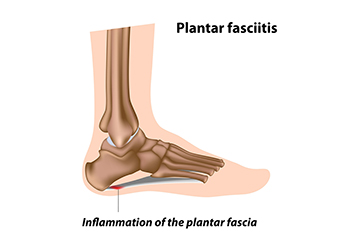
Plantar fasciitis is a common foot condition that results from inflammation and irritation of the plantar fascia, a thick band of tissue connecting the heel bone to the toes. The hallmark symptom of plantar fasciitis is sharp, stabbing heel pain, which can sometimes radiate along the arch or sole of the foot. Some individuals may experience periodic, temporary flares of intense heel pain, while others may have persistent, chronic discomfort in their feet. This pain is often most intense in the morning or after extended rest, and it typically eases within 10 minutes of walking or stretching. However, it can worsen toward the end of the day due to prolonged standing or activities, like climbing stairs and intense exercise, which can stress the plantar fascia. Inflammation of the plantar fascia can lead to visible swelling and redness around the heel and arch of the foot. Even when not visually swollen, the affected area can feel tender and puffy when touched. Additionally, the condition can affect the Achilles tendon, leading to pain. Tightness in the plantar fascia also can cause the foot to roll inward while walking, increasing stress and tension on the Achilles tendon. If you believe you may have plantar fasciitis, it is suggested that you make an appointment with a podiatrist, a medically trained foot doctor, who is able to help you manage this painful condition.
Plantar fasciitis is a common foot condition that is often caused by a strain injury. If you are experiencing heel pain or symptoms of plantar fasciitis, contact Dr. Richard DiMario from Maine. Our doctor can provide the care you need to keep you pain-free and on your feet.
What Is Plantar Fasciitis?
Plantar fasciitis is one of the most common causes of heel pain. The plantar fascia is a ligament that connects your heel to the front of your foot. When this ligament becomes inflamed, plantar fasciitis is the result. If you have plantar fasciitis you will have a stabbing pain that usually occurs with your first steps in the morning. As the day progresses and you walk around more, this pain will start to disappear, but it will return after long periods of standing or sitting.
What Causes Plantar Fasciitis?
There are some risk factors that may make you more likely to develop plantar fasciitis compared to others. The condition most commonly affects adults between the ages of 40 and 60. It also tends to affect people who are obese because the extra pounds result in extra stress being placed on the plantar fascia.
Prevention
There are a variety of treatment options available for plantar fasciitis along with the pain that accompanies it. Additionally, physical therapy is a very important component in the treatment process. It is important that you meet with your podiatrist to determine which treatment option is best for you.
If you have any questions, please feel free to contact our office located in York, ME . We offer the newest diagnostic and treatment technologies for all your foot care needs.